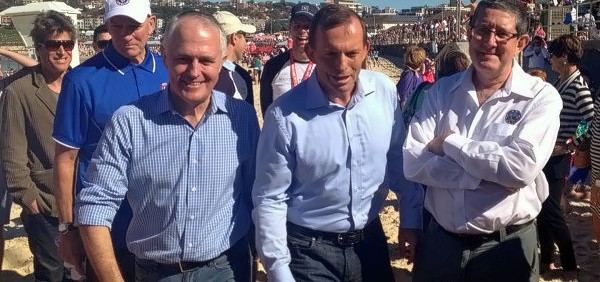In a dramatic day in Australian politics yesterday, Malcom Turnbull challenged incumbent Prime Minister Tony Abbott. And the winner was Malcolm.
But the numbers were super tight and the victory for Malcolm Turnbull is far from clear cut. A vote taken in the party room at 9.15 resulted in 54 votes for Malcolm Turnbull and 44 for Tony Abbott.
Events unfolded quickly. With the expectation of a significant swing against the government in Saturday’s upcoming Canning by-election, restive liberals had waited long enough. At 4 pm Malcom Turnbull addressed the media, stating that the Abbott Government had not been successful “in providing the economic leadership our nation needs. … We need a different style of leadership. … It is clear the people have made up their minds about Mr Abbott’s leadership”. He then confirmed that he had resigned as Minister for Communications and would be asking the Prime Minister for a leadership ballot.
Two hours later, Mr Abbott responded.
“We are not the Labor Party”, he said. “This country needs strong and stable government … at all costs avoiding the revolving door of the Labor leadership. You can trust me to deliver a stronger economy and a safer community… I will be a candidate and I expect to win. The destabilisation just has to stop.”
Over the following three hours many Cabinet ministers pledged their support for Mr Abbott, in particular Mr Hockey who said, “The disloyalty of some is outrageous. We have an economic plan that is working.”
The ballot was called for 9.15pm and just half an hour before, ABC TV reported the projected numbers to be separated by just two votes. But as we have since seen, the numbers were slightly better for now Prime Minister Turnbull, and decisive for Julie Bishop as Deputy Leader, at 70 votes compared to Kevin Andrews at 30 votes.
Opinion: The Abbott Legacy
What goes around usually does come around and yesterday it did for former Prime Minister Tony Abbott. It’s called karma.
A self-proclaimed ‘fighter’, his pugilistic political style – frequently described as ‘Dr. No’ – won him the prime ministership of Australia in September 2013. Yet a few days after his government’s second anniversary, the Prime Minister faced a leadership challenge from the man he deposed as party leader in 2007.
The trigger was increasingly dire predictions of a 10 per cent+ swing in the Canning by-election, which will take place on Saturday 19 September. But this leadership challenge has been coming since the ‘non-spill’ in February, when Tony Abbott faced off an empty chair, and won. He promised then that he would listen, that good government would start on that day, but his ‘fighter’ personality was hard to shrug off. And six months later, relentlessly consistent polling showing the Liberal Party on track to lose the next Federal Election on a two-party preferred basis became too hard to ignore. In particular, the perception that the conservative government was not able to manage our economy, with most indicators (unemployment, consumer confidence, business investment) confirming a lack of faith that economic growth was highly unlikely in the short term.
As commentators noted when ex-PM Abbott left the party room, it’s a long walk. No one enjoys anyone’s humiliation or distress. Politicians are human beings who hurt as much as the rest of us. But it would be dishonest to pretend that Mr Abbott’s prime ministership has been either successful or good for this country. His so-called ‘Captain’s picks’ have been foolish at worst, damaging at best. His lack of understanding of those in need – people on welfare, the unemployed or refugees – was a severe hindrance to social equity. And his strong views on climate change, alternative energy and same-sex marriage were out of step with most Australia. Additionally, his inability as Minister for Women to properly support the needs and rights of Australia women has basically sidelined half of the population.
It must be very difficult to work in Canberra and still keep your finger on the pulse of the priorities of ordinary Australians. But that is what prime ministers need to do. Our new Prime Minister is an extremely wealthy and successful man. Tellingly, he did not call for strong leadership, he said we need strong economic leadership. And while highlighting the need for us to be agile, innovative and creative, he did not once mention a vision for a fair and equitable country. He will need to work doubly hard to understand what really goes on in mainstream Australian life.
What do you think? Are you happy with the result? Will the vote for Malcolm Turnbull mean we can now expect a more stable government?
And what are the implications for Bill Shorten and the Labor Opposition?

